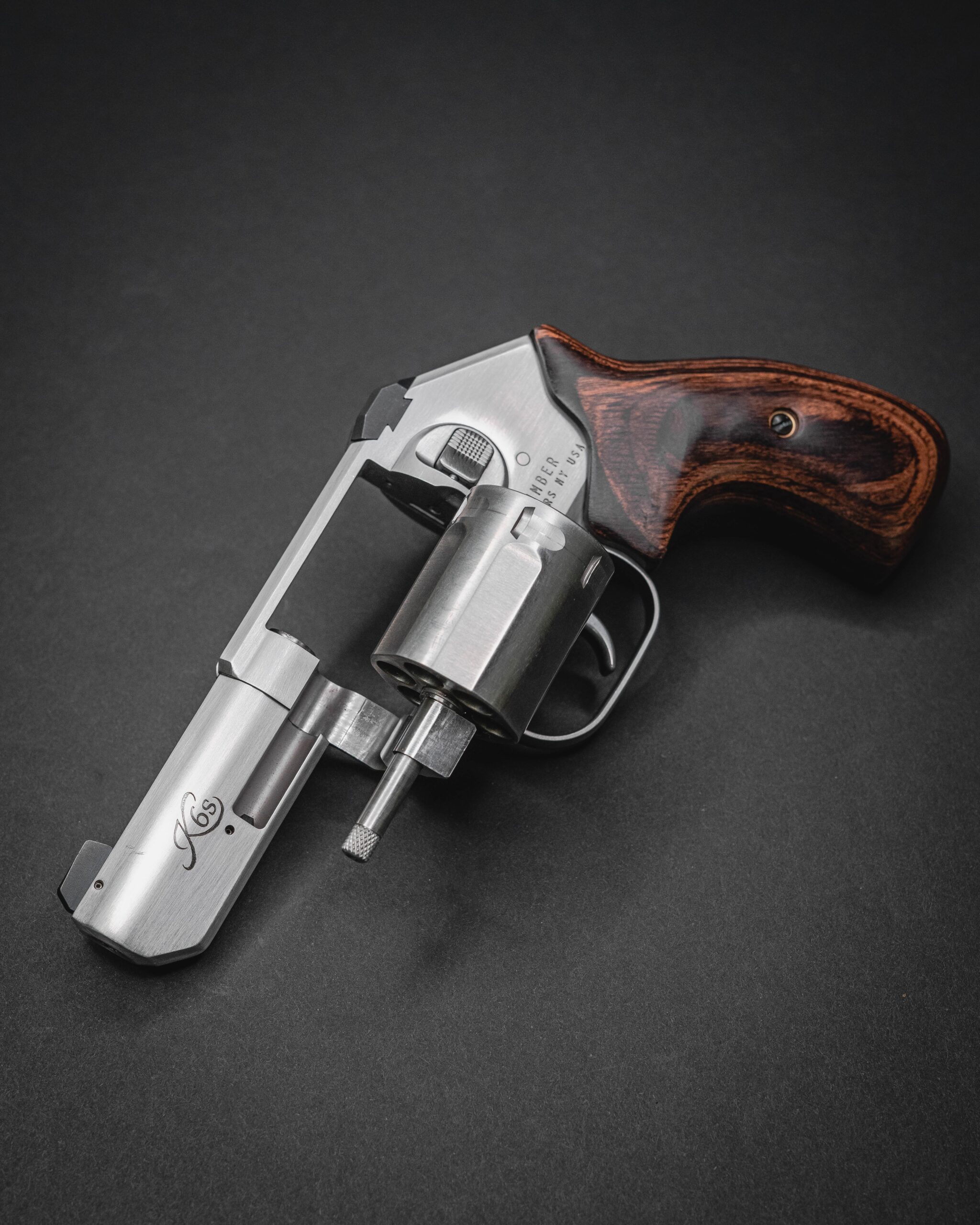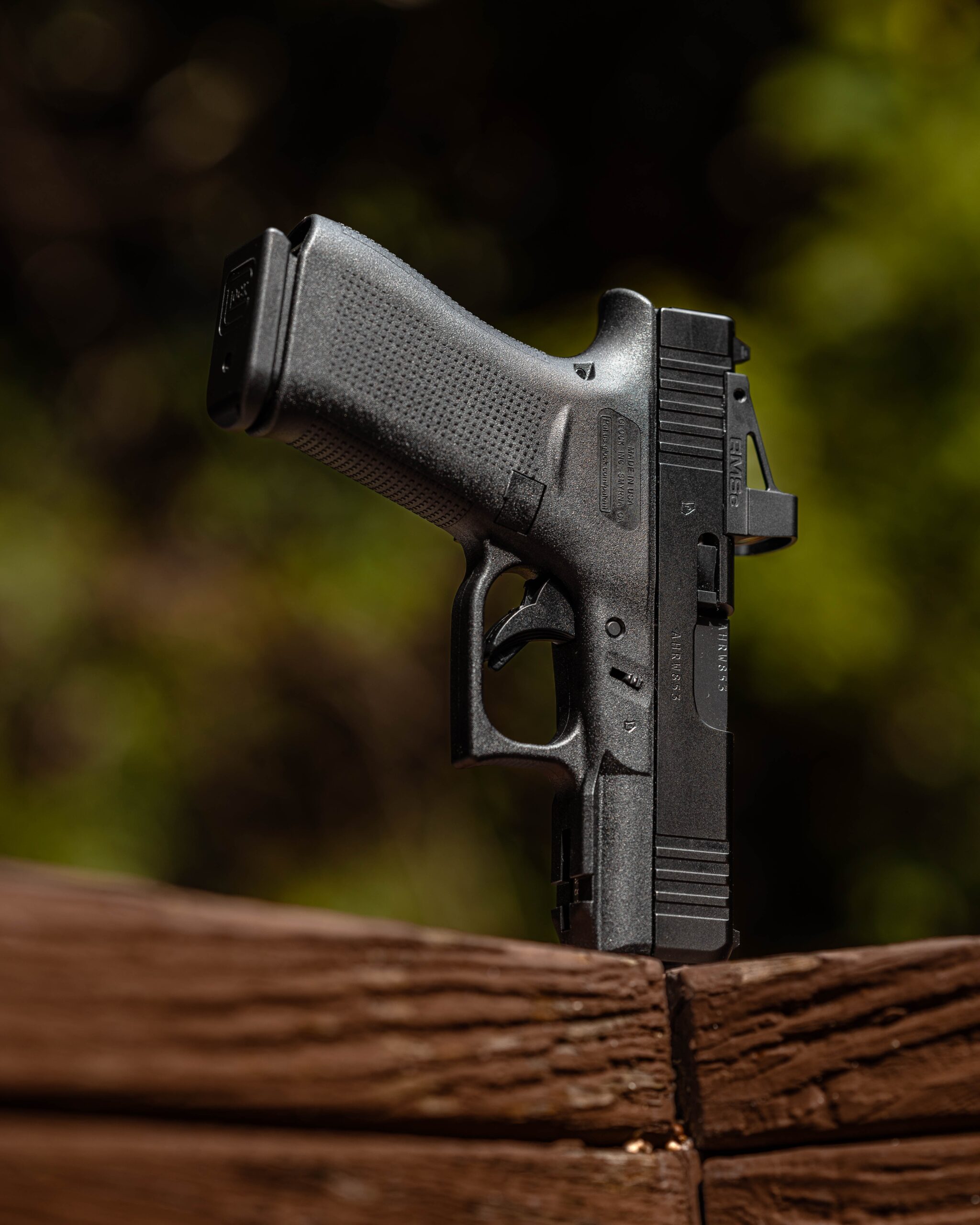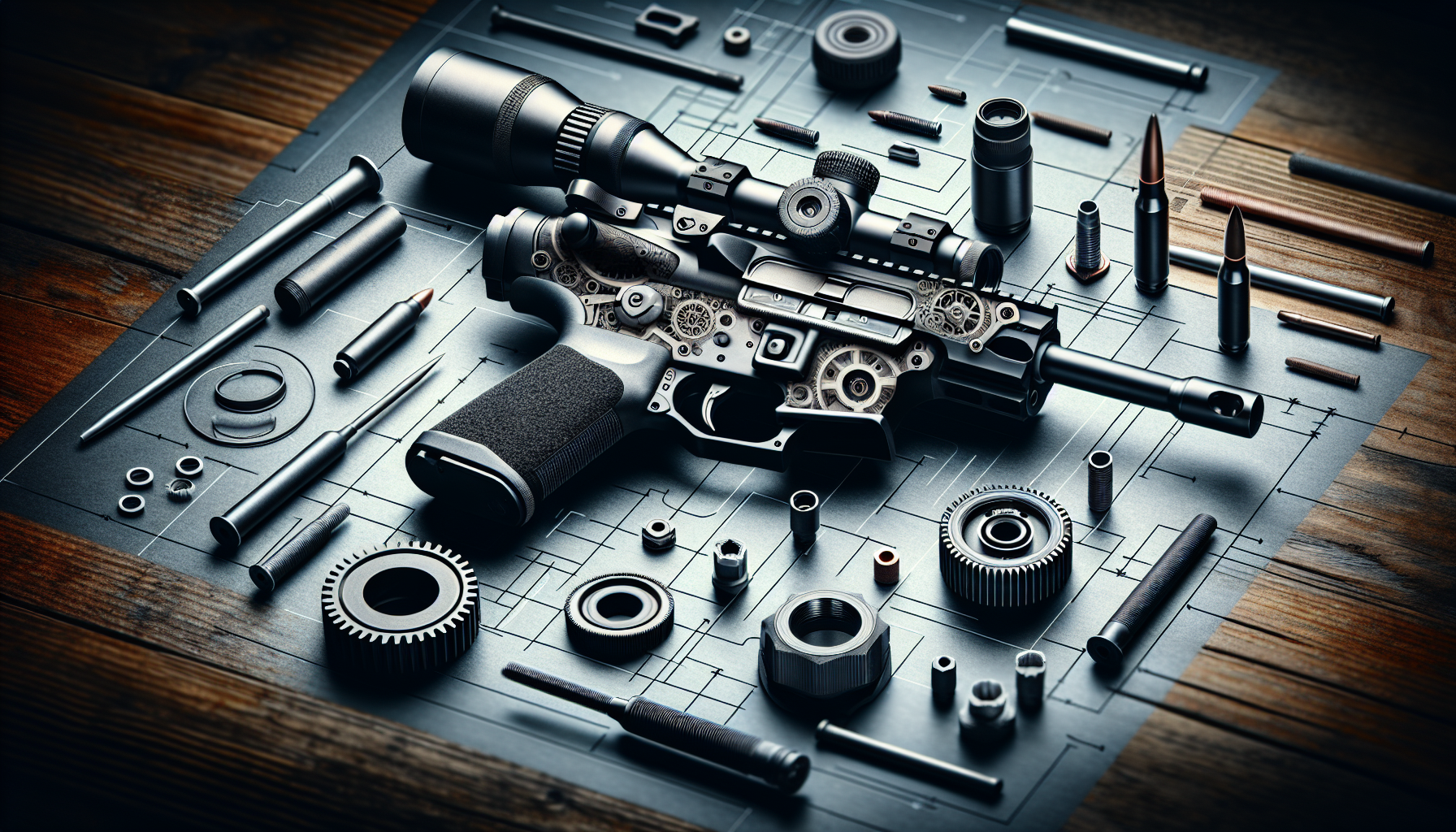Imagine this scenario: You’re at the shooting range, eagerly awaiting the exhilarating kick of your favorite handgun. But what if there was a way to enhance your accuracy and precision without compromising on the recoil? In this article, we will explore the intriguing question of whether using a rifle scope on a handgun can actually affect its recoil. Get ready to uncover the surprising connection between scope attachments and handgun performance, and discover how this simple addition could revolutionize your shooting experience.
Understanding the Basics of Handgun and Rifle Scopes
Definitions and Terminologies
When it comes to understanding the basics of handgun and rifle scopes, it’s important to first clarify what these terms mean. A scope is an optical device that magnifies the target, allowing for improved accuracy and target acquisition. Handgun scopes are specifically designed for use on handguns, while rifle scopes are designed for rifles. While the basic function of both types of scopes is the same, there are distinct characteristics and implications when it comes to using them on different firearms.
The Distinct Characteristics of Handgun and Rifle Scopes
Handgun scopes and rifle scopes may look similar at first glance, but there are a few key differences that set them apart. Firstly, handgun scopes are typically smaller and more compact than rifle scopes. This is because handguns are generally smaller firearms, and the size of the scope needs to be proportionate to the overall size and weight of the handgun. Additionally, handgun scopes often have lower magnification levels compared to rifle scopes, as handguns are typically used at closer ranges.
The Purpose of Scopes
The primary purpose of using a scope, whether it be on a handgun or a rifle, is to enhance accuracy and target acquisition. By magnifying the target, a shooter is able to see finer details and aim more precisely. This can be particularly useful in situations where visibility may be compromised, such as low light conditions or when shooting at longer distances. Scopes also provide the shooter with a clearer sight picture, reducing the chances of missing the target.
The Technical Aspects of Scopes on Handguns
The Science Behind Recoil
To understand how scopes work on handguns, it’s important to first explore the science behind recoil. Recoil is the backward movement of a firearm upon firing, caused by the force generated by the explosion of the ammunition. When a round is fired from a handgun, the energy created by the explosion is transferred through the firearm, causing it to move backwards and upwards. This recoil can affect the shooter’s ability to maintain accuracy and stability.
How Scopes Work on Handguns
Handgun scopes attach to the handgun’s slide or frame and allow the shooter to aim and acquire targets with greater precision. The magnification provided by the scope enables the shooter to see the target more clearly, improving accuracy and overall shooting performance. The scope’s reticle, or crosshairs, helps the shooter to align the firearm with the target. This combination of magnification and reticle allows for improved shot placement.
The Implication of Adding Extra Weight with a Scope
It’s important to consider the added weight of a scope when attaching it to a handgun. The weight of the scope can affect the balance and handling of the firearm, potentially impacting the shooter’s ability to maintain stability and control. Additionally, the added weight can also impact the handgun’s recoil characteristics, which can in turn affect the shooter’s ability to accurately follow up shots.
The Effect of Rifle Scopes on Handgun Stability
The Balance of a Handgun
Handguns are designed to be balanced in a way that allows for easy handling and maneuverability. The balance of a handgun refers to its distribution of weight, typically centered around the grip. This balance allows the shooter to maintain control and stability while aiming and firing the handgun.
The Addition of a Rifle Scope
Adding a rifle scope to a handgun can alter its balance, due to the additional weight and the positioning of the scope on the firearm. Rifle scopes are generally longer and heavier than handgun scopes, and their placement on the handgun can shift the center of gravity forward. This shift in balance can affect the overall stability and handling of the handgun.
Changes in Handgun Stability due to a Longer Scope
When a longer rifle scope is mounted on a handgun, it can significantly change the overall length of the firearm. This change in length can impact the balance and stability of the handgun, as it will require the shooter to adjust their grip and shooting technique. The longer scope may also affect the shooter’s ability to quickly transition between targets, as the increased length can limit the maneuverability of the handgun.
Impact of Rifle Scopes on Handgun Recoil
Direct Effects on Recoil
Using a rifle scope on a handgun can have direct effects on the handgun’s recoil characteristics. The additional weight added by the scope can increase the overall recoil felt by the shooter. This increased recoil can affect the shooter’s ability to maintain accuracy and follow-up shots. Additionally, the longer length of a rifle scope can also contribute to increased muzzle rise, further impacting the shooter’s ability to quickly reacquire the target.
Psychological Effects and Perception of Recoil
In addition to the direct effects on recoil, the use of a rifle scope on a handgun can also have psychological effects on the shooter. The perception of recoil can be influenced by various factors, including the shooter’s expectations and previous experiences. Some shooters may perceive increased recoil when using a rifle scope on a handgun, even if the actual recoil forces remain unchanged. This perception can impact the shooter’s confidence and shooting performance.

Potential Benefits of Using Rifle Scopes on Handguns
Increased Accuracy
One of the key benefits of using a rifle scope on a handgun is the potential for increased accuracy. The magnification provided by the scope allows for improved target acquisition and a clearer sight picture. This can greatly enhance a shooter’s ability to place accurate shots, particularly at longer distances or in challenging shooting conditions. The increased precision offered by the scope can make a significant difference in both precision shooting and practical applications, such as hunting or competition shooting.
Potential Range Extension
By providing magnification, rifle scopes can also extend the effective range of a handgun. The ability to clearly see and aim at targets that would otherwise be difficult to discern with the naked eye allows the shooter to engage targets at longer distances. This can be particularly advantageous in situations where a shooter needs to engage targets beyond the typical effective range of a handgun.
Improved Target Acquisition
Rifle scopes on handguns also offer improved target acquisition. The magnification and clarity provided by the scope allow the shooter to quickly and accurately identify and engage targets. This can be especially valuable in self-defense situations or in environments where quick target acquisition is vital. The ability to acquire targets swiftly and accurately can greatly enhance the shooter’s overall effectiveness and response time.
Possible Drawbacks of Using Rifle Scopes on Handguns
Altered Handling and Comfort
While there are potential benefits to using rifle scopes on handguns, there are also some drawbacks to consider. One of the main drawbacks is the potential alteration of the handgun’s handling and comfort. The added weight and length of a rifle scope can affect the overall balance and maneuverability of the handgun, making it feel less comfortable to handle. This can impede the shooter’s ability to quickly and accurately aim, resulting in decreased shooting performance.
Increase in Recoil
As mentioned earlier, the use of a rifle scope on a handgun can contribute to an increase in perceived recoil. The additional weight and length of the scope can affect the handgun’s recoil characteristics, potentially making it more difficult for the shooter to control and accurately follow up shots. This increased recoil can impact a shooter’s confidence and ability to deliver consecutive shots on target.
Unwanted Shifts in Balance and Stability
Another drawback of using rifle scopes on handguns is the potential for unwanted shifts in balance and stability. The added weight of the scope can alter the center of gravity of the handgun, affecting its overall stability and control. This can make it more challenging for the shooter to maintain a steady and accurate aim. Additionally, the longer length of the scope can disrupt the shooter’s natural shooting position and technique, further impacting overall stability and consistency.

Comparing Handgun Scopes and Rifle Scopes
Underlying Differences in Purpose and Design
The design and purpose of handgun scopes and rifle scopes differ significantly. Handgun scopes are specifically engineered for use on handguns, taking into account their smaller size and typical shooting distances. These scopes are more compact and have lower magnification levels to accommodate the closer shooting ranges encountered with handguns. On the other hand, rifle scopes are designed for use on rifles, which can handle higher magnification levels and longer shooting distances. The larger size and longer length of rifle scopes reflect their intended usage on rifles.
Performance Comparison When Used on Handguns
When comparing the performance of handgun scopes and rifle scopes when used on handguns, there are several factors to consider. Handgun scopes, with their lower magnification levels and compact designs, are well-suited for close-range shooting. They provide enhanced accuracy and target acquisition within the effective range of handguns. On the other hand, using a rifle scope on a handgun can offer greater magnification and potentially extend the effective range of the firearm. However, this comes with added weight, length, and potential handling challenges that may affect the shooter’s overall performance.
Addressing Common Misconceptions
Does Bigger Mean Better?
One common misconception when it comes to scopes is the belief that bigger means better. While larger scopes may offer higher magnification levels, this does not necessarily mean they are better for all shooting scenarios. The size and weight of a scope should be proportional to the firearm it is being used on. For handguns, a scope that is too large or heavy can negatively impact the balance, stability, and overall performance of the firearm. It’s important to choose a scope that is appropriate for the specific firearm and shooting needs.
The Myth of the ‘No-Recoil’ Scope
Another misconception is the notion of a “no-recoil” scope. Some shooters believe that using a specific scope will completely eliminate recoil and make shooting more comfortable. However, it’s important to note that no scope can eliminate recoil entirely. Recoil is a natural result of the physics involved in firing a firearm. While a scope can potentially affect the perception and management of recoil, it cannot completely eliminate it. Shooters should be aware of this misconception and understand that recoil will always be a factor, regardless of the scope used.

Guidelines for Using Scopes on Handguns
Choosing the Right Kind of Scope
When selecting a scope for use on a handgun, it is crucial to choose a scope that is appropriate for the specific firearm, shooting needs, and shooting distances. Considerations such as magnification level, reticle type, and overall weight should be taken into account. It’s essential to strike a balance between the desired features of the scope and its impact on the balance, stability, and handling of the handgun. Researching different options and seeking expert advice can help in finding the right scope for each individual shooter.
Installation Tips
Proper installation of a scope on a handgun is critical to optimize its performance and avoid any potential issues. Following the manufacturer’s instructions and utilizing the appropriate mounting hardware is essential for a secure and stable attachment. Taking care to ensure that the scope is properly aligned and tightened can prevent any shifts or movement during shooting. Regularly checking the mounting hardware and making any necessary adjustments or repairs is important for maintaining the integrity and effectiveness of the scope.
Safe and Proper Usage
Using a scope on a handgun requires the shooter to adhere to safe and proper usage practices. Familiarity with the scope’s operation, including adjusting the magnification and reticle, is important for maximizing its potential benefits. Regular practice and training with the scoped handgun can help the shooter become more comfortable and proficient in its use. Additionally, proper firearm safety protocols, such as always treating the handgun as if it is loaded and keeping the muzzle pointed in a safe direction, should always be followed when using any firearm, regardless of the presence of a scope.
Conducting Further Research on Scopes and Recoil
The Importance of Personal Testing
While this article provides an overview of the implications of using rifle scopes on handguns, it’s important to note that individual experiences may vary. Factors such as personal shooting style, firearm characteristics, and ammunition choice can all influence the impact of a scope on handgun recoil. Therefore, conducting personal testing and experimenting with different combinations of scopes and handguns is crucial for understanding how these factors interact and affect shooting performance.
Resources for Further Learning
For those looking to further explore the subject of scopes and recoil, there are numerous resources available. Researching articles, books, and online forums that specifically address scopes and recoil can provide valuable insights and experiences from experts and fellow shooters. Additionally, manufacturers of scopes and firearms often provide detailed information and resources on their websites, offering guidance on proper usage and compatibility.
Considering Expert Opinions and Reviews
Taking into account expert opinions and reviews can also be helpful when conducting research on scopes and recoil. The experiences and knowledge of experienced shooters, firearms instructors, and industry professionals can offer valuable perspectives and recommendations. Reading reviews and testimonials from other shooters who have used specific combinations of scopes and handguns can provide insights into the performance and compatibility of different setups.
In conclusion, using a rifle scope on a handgun can indeed affect the handgun’s recoil. The added weight and length of a scope can impact the balance, stability, and overall handling of the handgun, potentially altering the shooter’s ability to control the firearm and accurately follow up shots. However, using a scope on a handgun also offers potential benefits, such as increased accuracy, potential range extension, and improved target acquisition. It’s crucial for shooters to consider their individual needs, preferences, and shooting conditions when deciding whether or not to use a scope on their handgun. Conducting personal testing, researching reliable resources, and seeking expert advice can help shooters make informed decisions and optimize their shooting performance.

